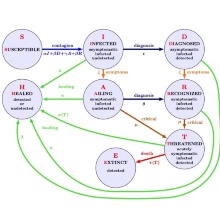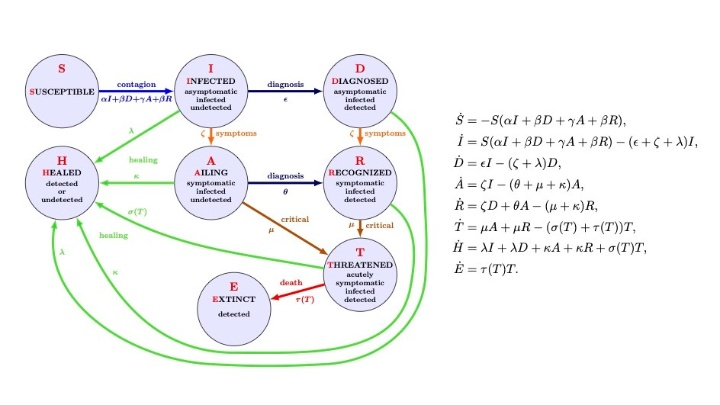In order to keep the rate of new infections in the Covid-19 epidemic low and at the same time limit the negative consequences on social and economic life, protective measures should be adapted to the respective case numbers. But what restrictions are necessary, and which lockdown regulations can be relaxed? This is difficult to estimate due to the uncertain and dynamic data situation and the complexity of the spreading and the measures. Researchers at the University of Stuttgart have now developed a computational model with which adaptive measures can be determined much more reliably when there is uncertainty.
In a recently published paper, a research team led by Prof. Frank Allgöwer, Head of the Institute for Systems Theory and Automatic Control (IST) at the University of Stuttgart, and member of the Cyber Valley research network as well as Deputy Director and Spokesperson of the EXC 2075 “Data-Integrated Simulation Science” Cluster of Excellence, analyzes the Covid-19 epidemic in Germany using control engineering methods. The team is developing strategies that provide information on when social distancing is necessary and to what extent.
The team based its calculations on the recently agreed step-by-step relaxation under specific conditions of protective measures against coronavirus infection. In the model, these specific conditions are expressed by increased infection rates. As an alternative, the researchers calculate the optimal course of action in the event that measures are relaxed or tightened. The problem with this is that models are generally inaccurate and therefore not very suitable for long-term predictions. It is therefore of the utmost importance that any strategy to contain the virus is continually adapted on the basis of current case numbers. Therefore, methods are needed to be able to adaptively determine the optimal control despite great uncertainties, or - scientifically speaking - a robust feedback strategy is necessary.
In order to solve this problem, Allgöwer and his team rely on the principle of so-called model predictive control, in the way it is also used, for example, in autonomous driving. In this method, the best strategy for the future is computed from a variety of data and strategies, but then only applied for a few days. This computational process is then repeated with updated parameters and the optimal strategy is determined again. This results in a continuous computational process in which the original strategy is continually adapted and several prediction models can also be taken into account.
Fewer deaths even without more stringent measures
Through the feedback implemented in the strategy, i.e. the adaptation of the measures to the current case numbers, the spreading of the virus can be well controlled even if the model is not accurate. First results show that, where there is uncertainty, such a regulation yields significantly better results than conventional strategies. It can also prevent a temporary need to tighten the measures again due to a sharp increase in the number of cases. “With the resulting optimized strategy, the number of future deaths caused by Covid-19 can be halved, although, overall, no stricter measures are necessary and there are no increased costs for the public or the economy,” hopes the head of the research team, Frank Allgöwer.
Expert Contact:
Prof. Frank Allgöwer, University of Stuttgart, Institute for Systems Theory and Automatic Control (IST), phone: +49 (0)711/685-67733, -67734 e-mail
Original publication:
Johannes Köhler, Lukas Schwenkel, Anne Koch, Julian Berberich, Patricia Pauli, Frank Allgöwer: “Robust and optimal predictive control of the COVID-19 outbreak”, Preprint



